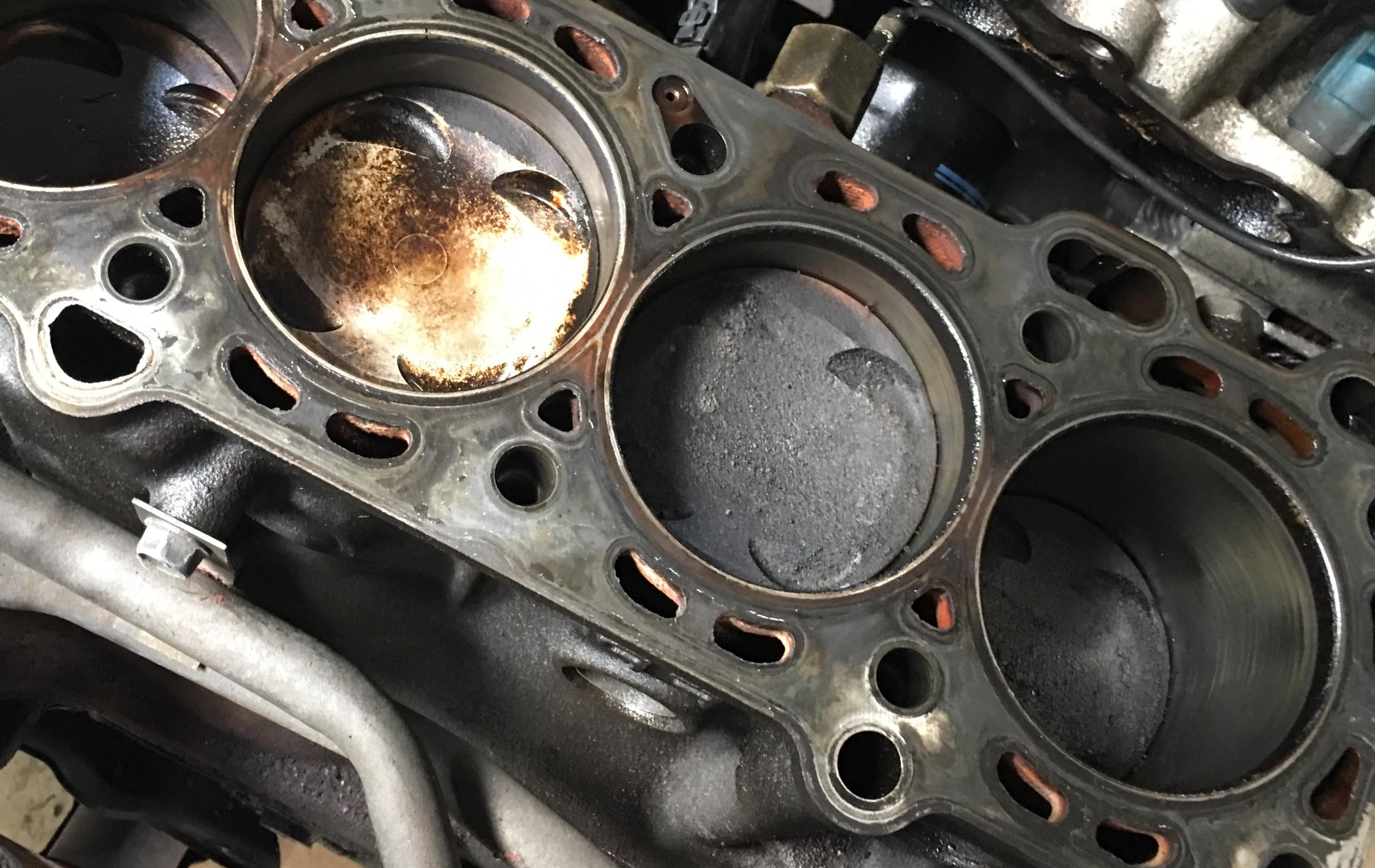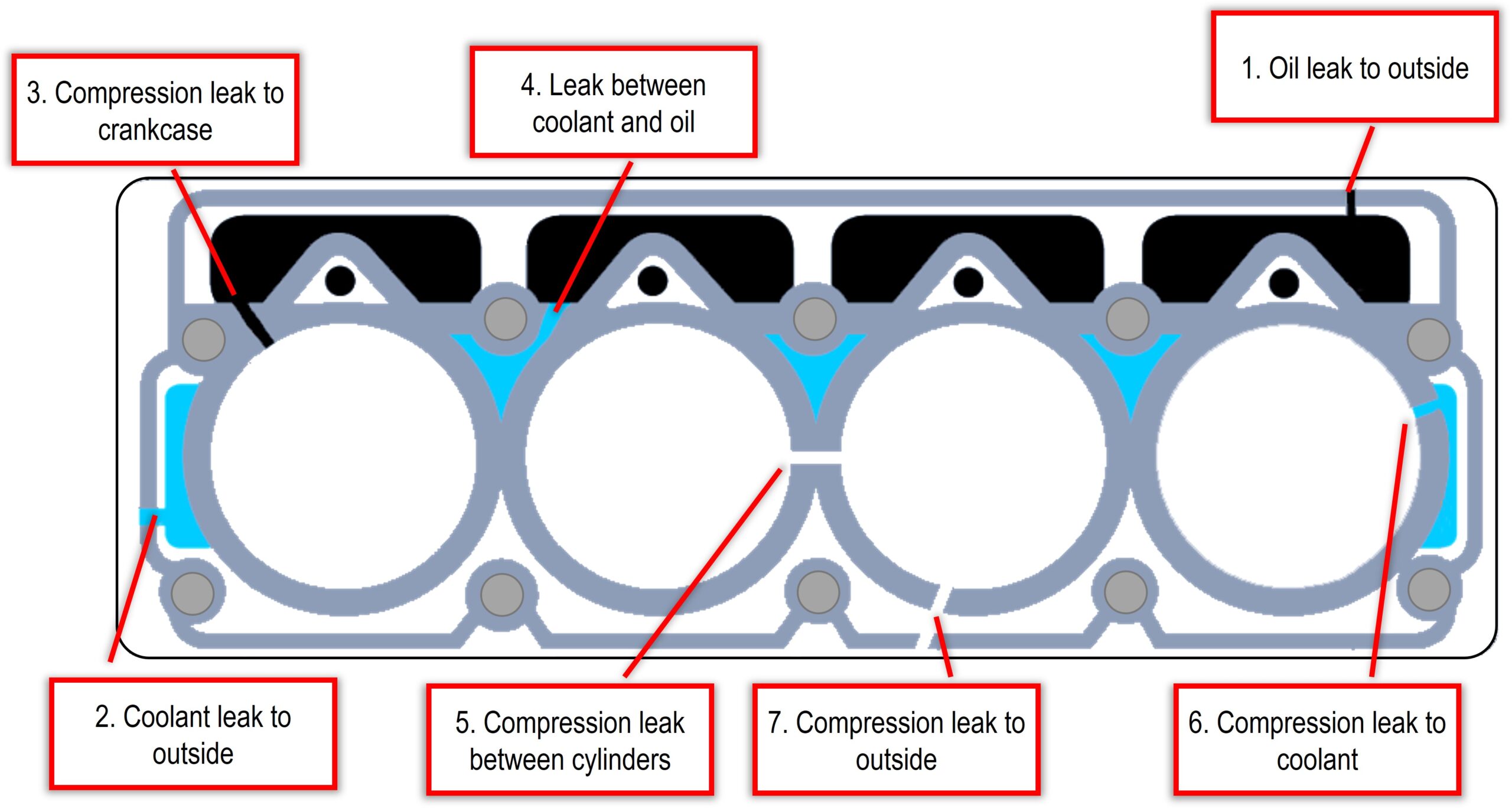Antifreeze leaking from the head gasket can cause engine overheating and damage. Immediate repair is crucial to prevent severe engine issues.
Antifreeze leaks from the head gasket occur when the seal between the engine block and cylinder head fails. This failure allows coolant to escape into the engine, leading to potential overheating and significant engine damage. The head gasket plays a critical role in maintaining the engine’s integrity by sealing the cylinders and preventing coolant and oil from mixing.
Regular maintenance and timely repairs can help avoid costly engine repairs. Always watch for signs like white smoke from the exhaust, engine overheating, or a sweet smell, as these indicate a possible head gasket leak. Addressing this issue promptly ensures your vehicle runs smoothly.

Credit: www.reddit.com
The Role Of Antifreeze In Engine Health
Antifreeze is crucial for your engine’s well-being. It keeps the engine from overheating and freezing. Understanding antifreeze’s role can help prevent costly repairs.
Function Of Antifreeze
Antifreeze does more than just regulate temperature. Here’s what it does:
- Prevents Overheating: Antifreeze raises the boiling point of water.
- Prevents Freezing: It lowers the freezing point of water.
- Prevents Corrosion: Antifreeze has inhibitors to stop rust.
Antifreeze mixes with water to balance engine temperature. This mix flows through the engine and radiator. It absorbs heat and cools the engine. This cycle repeats to keep your engine running smoothly.
Consequences Of Leakage
A leaking head gasket can cause antifreeze to escape. Here’s what can happen:
- Engine Overheating: Without enough antifreeze, the engine overheats.
- Engine Damage: Overheating can warp the engine block.
- Coolant Contamination: Antifreeze can mix with engine oil.
- Corrosion: Leaking antifreeze can corrode metal parts.
Signs of a leak include white smoke from the exhaust. Also, check for milky oil or bubbles in the coolant.
To avoid severe damage, address leaks quickly. Regularly check antifreeze levels. Look for signs of a head gasket leak. Early detection can save you time and money.
Head Gasket Basics
The head gasket is a crucial component in your car’s engine. It sits between the engine block and cylinder head. This gasket seals the cylinders to ensure maximum compression. It also prevents coolant and oil from mixing.
Purpose Of The Head Gasket
The head gasket has two main purposes:
- Sealing the cylinders to ensure high compression.
- Preventing oil and coolant from mixing.
Compression helps your engine run smoothly. Oil and coolant mixing can cause engine damage. The head gasket keeps everything in its place.
How Leaks Develop
Leaks usually start due to wear and tear. Extreme heat can cause the gasket to fail. Overheating is a common cause. It can warp the cylinder head. A warped head means the gasket can’t seal properly.
Other causes include:
- Poor installation of the head gasket.
- Using the wrong type of gasket for your engine.
- Frequent temperature changes in the engine.
Once a leak develops, antifreeze can seep out. This can cause engine overheating. Fixing the leak quickly is crucial.
Identifying Antifreeze Leaks
Antifreeze leaks from the head gasket can cause serious engine issues. Identifying these leaks early is crucial to avoid costly repairs. Below, we explore common symptoms and diagnostic tips to help you identify antifreeze leaks effectively.
Common Symptoms
Recognizing the symptoms of an antifreeze leak can save your engine. Here are some common signs:
- Overheating Engine: Your engine may overheat frequently.
- Sweet Smell: A sweet, syrupy smell inside or outside the car.
- White Smoke: White smoke coming from the exhaust pipe.
- Low Coolant Level: Coolant levels drop without visible leaks.
- Milky Oil: Oil appears milky or frothy, indicating contamination.
- Engine Misfires: Misfires during startup or while driving.
Diagnostic Tips
Proper diagnosis can pinpoint the source of the leak. Use these tips to diagnose antifreeze leaks:
- Check Coolant Levels: Regularly check and top up your coolant.
- Inspect for White Smoke: Observe the exhaust for persistent white smoke.
- Look for Milky Oil: Check the oil for a milky appearance.
- Use a Pressure Tester: A pressure tester can help identify leaks.
- Examine the Radiator Cap: Ensure the radiator cap is functioning properly.
- Consult a Mechanic: Professional diagnostics can confirm the issue.
Below is a table summarizing the symptoms and diagnostic methods:
| Symptom | Diagnostic Method |
|---|---|
| Overheating Engine | Check coolant levels, inspect for leaks |
| Sweet Smell | Smell test inside and outside the car |
| White Smoke | Observe exhaust during startup and driving |
| Low Coolant Level | Regularly monitor coolant levels |
| Milky Oil | Inspect oil for contamination |
| Engine Misfires | Check for misfires during startup |
Temporary Fixes For Antifreeze Leaks
Antifreeze leaks from a head gasket can be troubling. Fixing the issue quickly is essential. Temporary fixes can help until a professional repair is possible. Let’s explore some effective solutions to manage these leaks.
Commercial Sealants
Commercial sealants offer a quick and easy solution. They can seal small leaks effectively.
- BlueDevil Head Gasket Sealer: Ideal for small leaks. Just pour into the radiator.
- Bar’s Leaks Head Gasket Fix: Works well for minor leaks. It is easy to use.
- K-Seal: Works on all coolant leaks. It is simple to use.
Follow the instructions on the product label. Each product may have different steps. These sealants are not permanent fixes. They can help manage the leak temporarily.
Diy Solutions
Some DIY solutions can offer temporary relief. They are easy to implement.
- Eggs: Crack a few eggs into the radiator. This can seal small leaks.
- Pepper: Add a teaspoon of pepper to the radiator. It can help seal minor leaks.
- Ginger Powder: Add a spoonful to the radiator. It can help seal small leaks.
These solutions are not long-term fixes. They can help in an emergency. Always monitor the antifreeze level. Ensure the leak does not worsen.
| Solution | Effectiveness | Ease of Use |
|---|---|---|
| BlueDevil Head Gasket Sealer | High | Easy |
| Bar’s Leaks Head Gasket Fix | Medium | Easy |
| K-Seal | High | Easy |
| Eggs | Low | Moderate |
| Pepper | Low | Moderate |
| Ginger Powder | Low | Moderate |
Temporary fixes can help manage antifreeze leaks. Always seek a professional repair for a permanent solution.
Long-term Repairs For A Leaking Head Gasket
Dealing with a leaking head gasket can be challenging. It’s crucial to understand your long-term repair options. This ensures your vehicle runs smoothly and safely. Here, we’ll explore professional repair choices and the possibility of replacing the head gasket.
Professional Repair Options
Professional mechanics offer various solutions for a leaking head gasket. These experts can assess the damage accurately. They use specialized tools to detect the exact leak points. Here are some common professional repair options:
- Gasket Replacement: Mechanics replace the damaged gasket with a new one.
- Engine Block Resurfacing: This involves smoothing out the engine block surface.
- Cylinder Head Repairs: Fixing or replacing the cylinder head if it’s damaged.
Choosing professional repair ensures the job is done correctly. It’s often more reliable than DIY fixes.
Considering Replacement
In some cases, the head gasket might be beyond repair. Replacement becomes the best option. Here’s what to consider:
| Factors | Details |
|---|---|
| Cost: | Replacing a head gasket can be expensive. |
| Time: | Replacement takes more time compared to minor repairs. |
| Vehicle Age: | Older vehicles might need a full engine overhaul. |
If the leak is severe, replacing the head gasket is often necessary. It ensures your vehicle remains in good condition. Always consult with a professional before making a decision.

Credit: www.mysfcarguys.com
Preventive Measures To Avoid Future Leaks
Antifreeze leaking from the head gasket can cause serious issues. Preventing these leaks can save time and money. Regular maintenance and monitoring engine temperature are key steps.
Regular Maintenance
Regular maintenance is crucial for preventing antifreeze leaks. Follow these steps:
- Check coolant levels monthly.
- Inspect hoses for wear and tear.
- Replace the thermostat as needed.
- Flush the cooling system every two years.
Keeping the cooling system in good condition helps avoid leaks. Always use the right type of antifreeze for your car.
Monitoring Engine Temperature
Monitoring the engine temperature is important. A hot engine can lead to leaks. Follow these tips:
- Watch the temperature gauge while driving.
- Stop the car if the engine overheats.
- Check for coolant leaks if the temperature rises.
Keeping an eye on the engine temperature helps catch problems early. This can prevent costly repairs and keep your car running smoothly.
Understanding The Costs
Antifreeze leaking from a head gasket can lead to severe engine damage. Understanding the costs involved can help you make informed decisions. Repair costs vary based on whether you opt for a temporary or permanent solution.
Cost Comparison: Temporary Vs. Permanent Fixes
Temporary fixes are often cheaper but may not last long. These include sealants and quick repairs.
- Sealants: $10 – $50
- Quick Repairs: $100 – $200
Permanent fixes involve more extensive labor and parts. These are usually more reliable.
- Head Gasket Replacement: $1,000 – $2,500
- Engine Overhaul: $3,000 – $4,500
Budgeting For Repairs
When budgeting for repairs, consider the longevity of the solution. Temporary fixes may need frequent attention, adding to long-term costs.
Permanent fixes, although more expensive initially, often save money over time. They reduce the need for recurring repairs.
Prepare a repair budget by listing potential costs:
- Diagnostic Fees: $50 – $100
- Labor Costs: $500 – $1,500
- Parts: $500 – $1,000
Allocate additional funds for unexpected expenses. This can include additional parts or labor time.
Use the following table to summarize potential costs:
| Repair Type | Cost Range |
|---|---|
| Sealants | $10 – $50 |
| Quick Repairs | $100 – $200 |
| Head Gasket Replacement | $1,000 – $2,500 |
| Engine Overhaul | $3,000 – $4,500 |
By understanding the costs, you can plan and budget for your head gasket repairs effectively.
When To Seek Professional Help
Antifreeze leaking from the head gasket can spell trouble for your vehicle. Knowing when to seek professional help can save your engine. Acting quickly can prevent further damage and costly repairs.
Signs Of Major Damage
Some signs indicate major damage that requires professional attention:
- White smoke from the exhaust
- Overheating engine despite enough coolant
- Milky oil on the dipstick
- Persistent coolant loss
- Sweet smell from the exhaust
If you notice these signs, don’t delay. Seek expert help immediately.
Choosing A Reliable Mechanic
Finding a reliable mechanic is crucial for fixing head gasket issues. Here are some tips:
- Check for certifications like ASE.
- Read online reviews from other customers.
- Ask for referrals from friends or family.
- Compare prices and ask for estimates.
- Ensure they use high-quality parts and tools.
A good mechanic will diagnose the problem correctly. They will also use the best methods to fix it. This ensures your car runs smoothly and safely.

Credit: www.fluidlife.com
Frequently Asked Questions
What Causes Antifreeze To Leak From The Head Gasket?
A damaged head gasket can cause antifreeze to leak. This usually happens due to overheating or wear and tear. Proper maintenance can prevent this issue.
How Do I Know If My Head Gasket Is Leaking?
Common signs include white smoke from the exhaust, overheating, and milky oil. Check your coolant levels regularly to catch leaks early.
Can I Drive With A Leaking Head Gasket?
Driving with a leaking head gasket is risky. It can cause engine damage and overheating. It’s best to repair it immediately.
How Much Does It Cost To Fix A Head Gasket Leak?
Repairing a head gasket leak can cost between $1,000 and $2,000. The cost varies based on the vehicle model and labor rates.
Conclusion
Addressing an antifreeze leak from the head gasket is crucial for engine health. Ignoring it can cause severe damage. Regular maintenance and early detection are key. Consult a professional mechanic if you notice symptoms. Protect your vehicle by staying vigilant and proactive.
Keep your engine running smoothly and efficiently.
